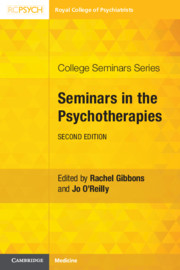Book contents
- Seminars in the Psychotherapies
- College Seminars Series
- Seminars in the Psychotherapies
- Copyright page
- Reviews
- Contents
- Contributors
- Foreword
- Preface
- Part I Therapy Theory and Practice
- Part II Applied Psychotherapeutic Thinking
- Section 1 Psychological and Psychodynamic Approaches to Psychiatry
- Chapter 13 Psychological Approaches to Affective Disorders
- Chapter 14 Psychological Approaches to Psychosis
- Chapter 15 Personality Disorder
- Chapter 16 Complex Post-traumatic Stress Disorder
- Chapter 17 Psychological Approaches to Medically Unexplained Symptoms
- Chapter 18 The Psychodynamics of Self-Harm
- Chapter 19 Psychodynamic Aspects of Suicide and Homicide
- Chapter 20 Forensic Psychotherapy
- Section 2 Work in Practice
- Section 3 Contemporary Developments
- Index
- References
Chapter 20 - Forensic Psychotherapy
from Section 1 - Psychological and Psychodynamic Approaches to Psychiatry
Published online by Cambridge University Press: 27 May 2021
- Seminars in the Psychotherapies
- College Seminars Series
- Seminars in the Psychotherapies
- Copyright page
- Reviews
- Contents
- Contributors
- Foreword
- Preface
- Part I Therapy Theory and Practice
- Part II Applied Psychotherapeutic Thinking
- Section 1 Psychological and Psychodynamic Approaches to Psychiatry
- Chapter 13 Psychological Approaches to Affective Disorders
- Chapter 14 Psychological Approaches to Psychosis
- Chapter 15 Personality Disorder
- Chapter 16 Complex Post-traumatic Stress Disorder
- Chapter 17 Psychological Approaches to Medically Unexplained Symptoms
- Chapter 18 The Psychodynamics of Self-Harm
- Chapter 19 Psychodynamic Aspects of Suicide and Homicide
- Chapter 20 Forensic Psychotherapy
- Section 2 Work in Practice
- Section 3 Contemporary Developments
- Index
- References
Summary
Forensic psychotherapy is the application of psychological knowledge to the assessment, treatment and management of mentally disordered offenders and patients who commit violent or destructive acts against others or themselves. Forensic psychotherapy creates a bridge between forensic psychiatry with its main focus on mental illness and risk, and psychoanalytical psychotherapy which aims to understand the conscious and unconscious motivations of offender or forensic patient [1]. Forensic psychotherapy emerged from a psychoanalytic theoretical framework, which continues to be its predominant influence, although its remit has widened to encompass other psychodynamic approaches, including group psychotherapy and therapeutic community approaches, and it is also influenced by the related disciplines of psychology, criminology, sociology, ethology, neuroscience, philosophy and ethics.
- Type
- Chapter
- Information
- Seminars in the Psychotherapies , pp. 259 - 272Publisher: Cambridge University PressPrint publication year: 2021

